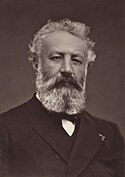Jules Verne Quote
Undoubtedly, my dear Dick. Just note the progress of events: consider the migrations of races, and you will arrive at the same conclusion assuredly. Asia was the first nurse of the world, was she not? For about four thousand years she travailed, she grew pregnant, she produced, and then, when stones began to cover the soil where the golden harvests sung by Homer had flourished, her children abandoned her exhausted and barren bosom. You next see them precipitating themselves upon young and vigorous Europe, which has nourished them for the last two thousand years. But already her fertility is beginning to die out; her productive powers are diminishing every day. Those new diseases that annually attack the products of the soil, those defective crops, those insufficient resources, are all signs of a vitality that is rapidly wearing out and of an approaching exhaustion. Thus, we already see the millions rushing to the luxuriant bosom of America, as a source of help, not inexhaustible indeed, but not yet exhausted. In its turn, that new continent will grow old; its virgin forests will fall before the axe of industry, and its soil will become weak through having too fully produced what had been demanded of it. Where two harvests bloomed every year, hardly one will be gathered from a soil completely drained of its strength. Then, Africa will be there to offer to new races the treasures that for centuries have been accumulating in her breast. Those climates now so fatal to strangers will be purified by cultivation and by drainage of the soil, and those scattered water supplies will be gathered into one common bed to form an artery of navigation. Then this country over which we are now passing, more fertile, richer, and fuller of vitality than the rest, will become some grand realm where more astonishing discoveries than steam and electricity will be brought to light.
Undoubtedly, my dear Dick. Just note the progress of events: consider the migrations of races, and you will arrive at the same conclusion assuredly. Asia was the first nurse of the world, was she not? For about four thousand years she travailed, she grew pregnant, she produced, and then, when stones began to cover the soil where the golden harvests sung by Homer had flourished, her children abandoned her exhausted and barren bosom. You next see them precipitating themselves upon young and vigorous Europe, which has nourished them for the last two thousand years. But already her fertility is beginning to die out; her productive powers are diminishing every day. Those new diseases that annually attack the products of the soil, those defective crops, those insufficient resources, are all signs of a vitality that is rapidly wearing out and of an approaching exhaustion. Thus, we already see the millions rushing to the luxuriant bosom of America, as a source of help, not inexhaustible indeed, but not yet exhausted. In its turn, that new continent will grow old; its virgin forests will fall before the axe of industry, and its soil will become weak through having too fully produced what had been demanded of it. Where two harvests bloomed every year, hardly one will be gathered from a soil completely drained of its strength. Then, Africa will be there to offer to new races the treasures that for centuries have been accumulating in her breast. Those climates now so fatal to strangers will be purified by cultivation and by drainage of the soil, and those scattered water supplies will be gathered into one common bed to form an artery of navigation. Then this country over which we are now passing, more fertile, richer, and fuller of vitality than the rest, will become some grand realm where more astonishing discoveries than steam and electricity will be brought to light.
Related Quotes
About Jules Verne
In addition to his novels, he wrote numerous plays, short stories, autobiographical accounts, poetry, songs, and scientific, artistic, and literary studies. His work has been adapted for film and television since the beginning of cinema, as well as for comic books, theater, opera, music and video games.
Verne is considered to be an important author in France and most of Europe, where he has had a wide influence on the literary avant-garde and on surrealism. His reputation was markedly different in the Anglosphere where he had often been labeled a writer of genre fiction or children's books, largely because of the highly abridged and altered translations in which his novels have often been printed. Since the 1980s, his literary reputation has improved.
Jules Verne has been the second most-translated author in the world since 1979, ranking below Agatha Christie and above William Shakespeare. He has sometimes been called the "father of science fiction", a title that has also been given to H. G. Wells and Hugo Gernsback. In the 2010s, he was the most translated French author in the world. In France, 2005 was declared "Jules Verne Year" on the occasion of the centenary of the writer's death.
